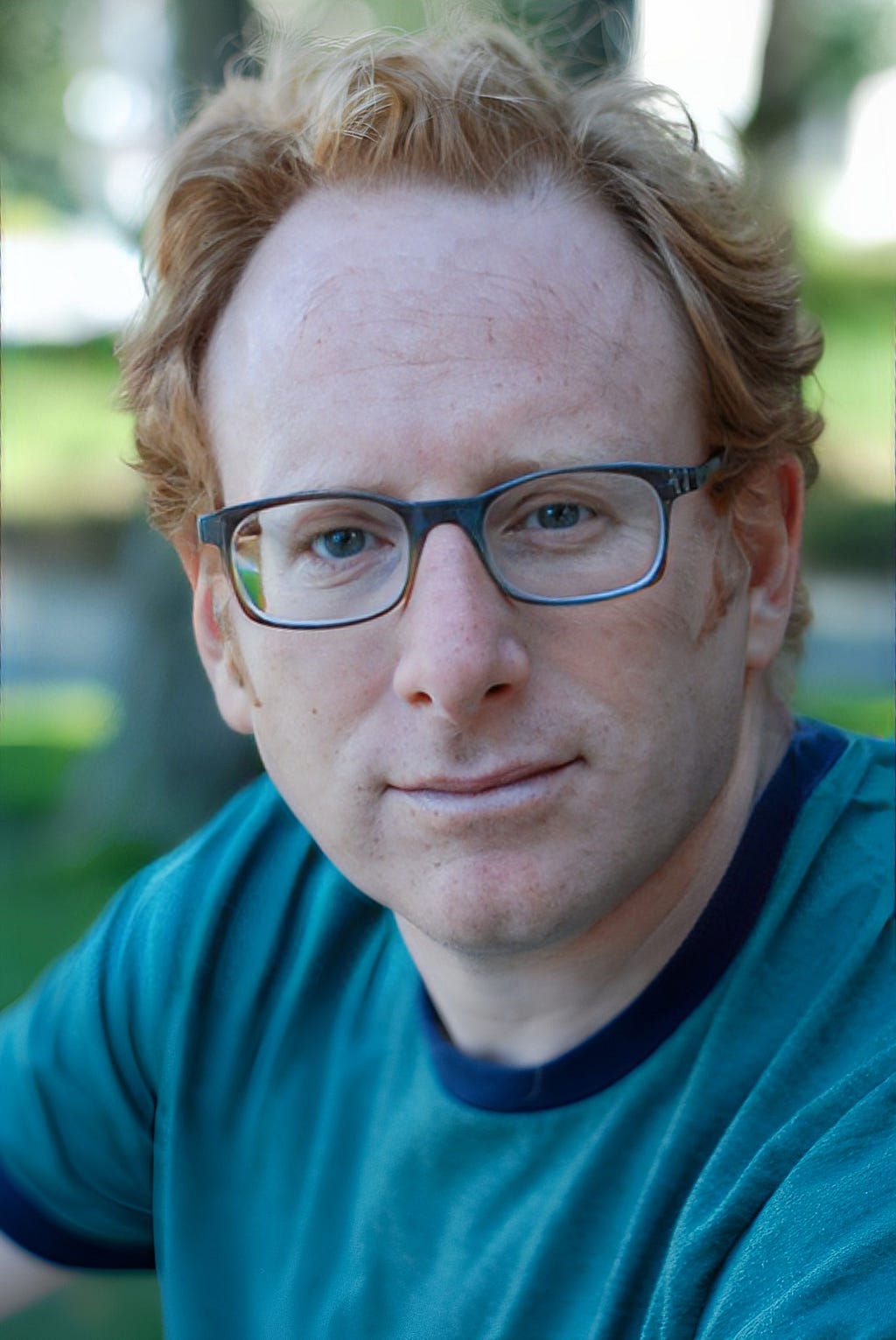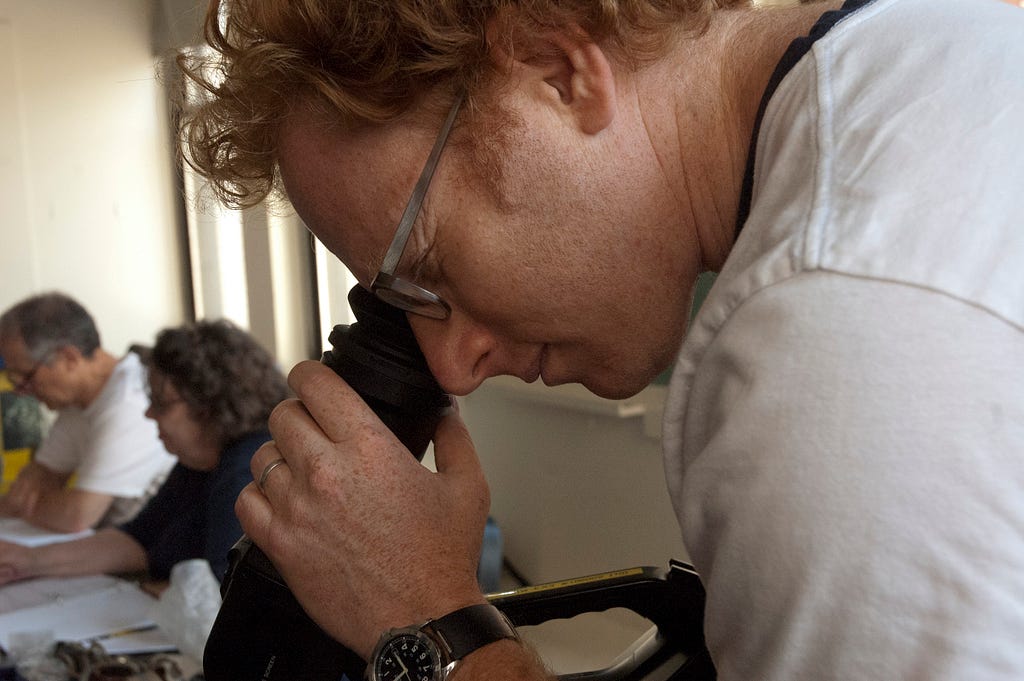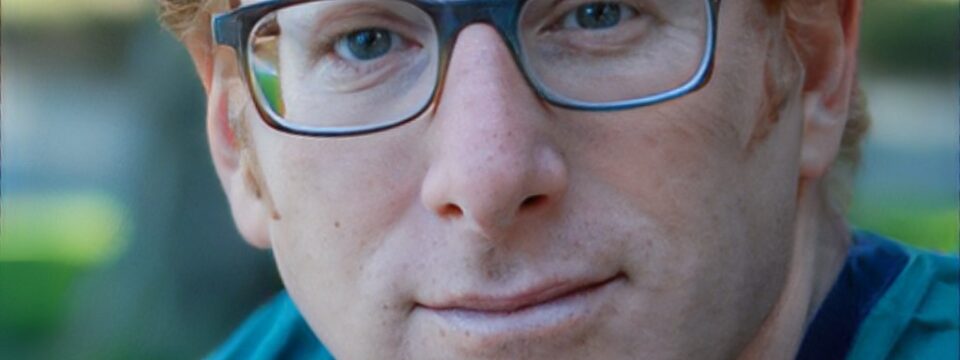
I sometimes wished someone had told me to make a documentary about inanimate objects or long-dead historical figures. Getting calls from my actors, central to the movie, who were certain I was in the edit room, cutting them out of the narrative, was something I didn’t relish. But I get it: they’re actors because they’re a little insecure. And having Parkinson’s disease doesn’t help. I could empathize, and I hope I was a little therapeutic as these guys relaxed into seeing their journey on the screen.
As a part of our series about “Filmmakers Making A Social Impact” I had the pleasure of interviewing Jim Bernfield.
Jim produced and directed “Me To Play,” the award-winning documentary about two New York actors with Parkinson’s disease who put up an off-Broadway performance of Samuel Beckett’s masterpiece, “Endgame.” Jim’s short script “Alphamale!” won the Nickelodeon Comedy Screenwriting Award, his pilot script “The Second Oldest Profession” won the Creative World TV comedy competition, his short film “The Best Thanksgiving Ever” won awards at festival around the country, and his TV documentary “Rally Behind the Virginians” played on public television. An MFA from Columbia University’s School of the Arts, Jim lives with his family in Brooklyn and serves as Senior Vice President at Human Rights First and President of the 1661 Foundation.
Thank you so much for doing this interview with us! Before we dive in, our readers would love to get to know you a bit. Can you share your “backstory” that brought you to this career?
I spent many years writing, directing, and producing issue and advocacy commercials for progressive candidates and campaigns. I’ve probably made over ten thousand ads. I came from politics, and fell in love with putting images together in compelling ways. It turned out that love telling stories — even ones that need to be wrapped up in thirty seconds. But I wanted a broader palette, and longer run-times, so I went to film school at Columbia University. I had some great teachers and collaborators, and have found myself balancing my interest in creative work with my passion for bringing social change.
Can you share the funniest or most interesting story that occurred to you in the course of your filmmaking career?
I love working with actors. For my thesis film at Columbia, I wrote and directed a short comedy about a boy just entering his teenage years who comes of age at his family’s terrible Thanksgiving visit to his cousins’ house. His older sister sabotages him, his older male cousins terrorize him, his uncle’s a blowhard, his mom ends up drunk and puking in the bathroom, and his dad has no facility to do much to help anybody. When everything’s gone absolutely wrong, his beautiful female cousin sits next to him on the steps of her house, they really see each other, and she gives him a kiss. That’s it. It’s “The Best Thanksgiving Ever.” And that’s the name of the movie.
The fun part was that playing the beautiful cousin was a thirteen or fourteen year-old Alexandra D’Addario. She was this lovely coltish teenage girl who was a great actor. Also on set were the cousins and the lead actor, also pre-teens. We’d be shooting a scene, and all of a sudden, a herd of hormonally-charged teenagers would scramble through, giggling and totally unaware. I loved watching it.
My production team would drive each morning from Manhattan’s Upper West Side to the suburbs where our house set was. In our car was the youngest cousin, who was absolutely crushing on Alex. And we could see the flicker of response from her, too. So we’d drive to or from set, coaching this sweet young actor on how to deal with his workplace crush.
One afternoon, it seemed to just end. He was sullen the whole ride home. And the next morning, when we picked him up, the whole crew peppered him with questions to pry him open. We offered probably a hundred years of male-female relationships in that car, and just wanted to help. But be just couldn’t figure out why she no longer liked him. Finally he says, pondering, lost, and forlorn, “maybe it’s ’cause I punched her in the boob.”
It didn’t take a century of relationship experience to know that no teen girl likes to be punched in the chest. Or anywhere. That was the end of that. Now look where she is. His loss.
Who are some of the most interesting people you have interacted with? What was that like? Do you have any stories?
In my previous career, making political ads, I have interacted with many politicians. People running for everything from town clerk to President of the United States. Some of them even won. I think they’re very much like actors, to be honest.
My political mentor, James Carville, used to say, among other things unfit to print, “politics is just show business for ugly people.” To some degree that’s true — not that they’re ugly, but that it can be a game to win the love of an audience. When they’re off-stage or out of the glare of the lights, they can be very much like Hollywood prima donnas: insular, defensive, and petty. Then the camera comes back on, and the energy’s back.
I worked on a movie starring Eddie Murphy and Michael Rappaport back when I was living in San Francisco. Murphy was at the top of his career, he had a million handlers. But Rappaport was just a street-smart guy from New York trapped in a hilly little town he didn’t know. It was my job to take him to lunch — to get him New York style comfort food. I remember we were eating some meatball sandwiches at a deli, when the news came on that some cabinet official had been killed in a plane crash outside the country, and the CNN anchors were hypothesizing about how this could blow up into a major international incident, maybe even war. Rappaport looks at the TV, clocks what’s going on, and says to me, “you know… this is a damn good sandwich.”
I was a set production assistant on the first big movie I worked on. A guy on assistant director’s team, which has just come off of making Michael Mann’s great “Heat,” tasked with keeping the helicopter pilot who was charged with taking the shots from the sky — and being a prop copter — from taking off. I’m a pipsqueak PA and there’s this gung-ho Vietnam Vet helicopter pilot who just wants to get in the air. They’ll call me on the walkie-talkie, I say. We’re out of range, he responds, he should just fly. Back and forth we go, for half a day. He promised me a ride in the chopper. Anything. But I keep him there. Finally, we get the word he can go up, and he does. I never get my ride. But I did my job. Thankless or not.
Which people in history inspire you the most? Why?
I am inspired by people who left their mark by changing things for the better. I love those people like Samuel Beckett who reimagined literature, writing, and theater to speak to people in new ways. And I am moved by people who see how thing could be altered to make people’s lives a little better. Robert Kennedy paraphrased as his 1968 presidential campaign theme a George Bernard Shaw quote, ““Some men see things as they are and say, why; I dream things that never were and say, why not.” So it’s those people, those pioneers, those revolutionaries that I most respect. I count on that list Orson Welles, Malcolm X, Thomas Paine, Lucille Ball, and many others. These are not perfect people, and I can’t endorse everything they may have done, but they left some pretty profound marks on the world we live in.
Let’s now shift to the main focus of our interview, how are you using your success to bring goodness to the world? Can you share with us the meaningful or exciting social impact causes you are working on right now?
The documentary I produced and directed, “Me To Play,” is about two professional New York actors with Parkinson’s disease who choose to lead with their hearts. Parkinson’s steals from actors all the elements necessary to undertake their craft — use of their bodies and control of their voices. But these two guys — Chris Jones and Dan Moran — don’t allow Parkinson’s to steal what they love — at least, they fight the disease to a draw for one more performance. This time, Samuel Beckett’s “Endgame.”
Beckett wrote “Endgame” after caring for his mother and favorite aunt as they succumbed to the disease. So the Nobel Laureate knew the ins and outs of living with this degenerative killer with no known cure. And the play he wrote is, in some important ways, a metaphor for living with the disease.
I’m also part of the Parkinson’s family; my dad died of the disease twenty years ago. So making this film I was very cognizant of the million Americans who have PD, and the 50 to 60,000 who are diagnosed with it every year. Through the run of the film, I tried to offer people who have the disease and their caregivers, families, and loved ones, a sense of the journey that is Parkinson’s disease.
I was gratified, if saddened, when the wife of one of the film’s editors told me, “My mother’s been diagnosed with Parkinson’s, and I’ve been sort of watching over your shoulders all these months. It’s really helped me understand the course of what’s happening and how to deal with it.”
Of course, my social impact isn’t just around Parkinson’s. In my day job, I am the Senior Vice President for Communications at Human Rights First, a non-profit organization taking on extremism, authoritarianism, social injustice, and the abuse of technology. The little things, you know?

Many of us have ideas, dreams, and passions, but never manifest it. But you did. Was there an “Aha Moment” that made you decide that you were actually going to step up and take action for this cause? What was that final trigger?
That’s a really interesting question, because it didn’t exactly work that way for me. My friend Dan told me about running lines with his friend and fellow Parkinson’s patient Chris, and it sounded like a great opportunity to chronicle a creative process. Only after I had completed the film and doing interviews around our festival premiere at Slamdance did I realize, while answering a question like this one, that I was following a very particular passion: processing for the first time my own father’s death from Parkinson’s and what caring for him had meant for me and my family.
Can you tell us a story about a particular individual who was impacted or helped by your cause?
I think that everybody knows somebody with a degenerative neurological disease like Parkinson’s or Alzheimer’s or many of the others. At the question-and-answer periods after showing the film at festivals, there’s usually someone close to tears who asks a question that’s usually not really a question. They’re using the moment to process the battle against a disease like this that somebody close to them is fighting. They usually come down to the stage after the Q and A period, too, and treat me — a documentary filmmaker — like some sort of doctor. There’s no medical advice in the film, but there’s life advice. It’s this: tomorrow isn’t promised to anybody. Go out and face that challenge. If these guys, with all their limitations, can do an incredible performance of a difficult play like “Endgame,” you can face your challenge, too.
Are there three things that individuals, society or the government can do to support you in this effort?
Individuals should respect people with disabilities. You never know when you’ll be faced with your own, and I assume you’d like to be treated with respect.
Society should use the arts more fully to understand each other and our world. People think Beckett is this arcane genius offering a post-apocalyptic nightmare. If you watch and listen, he’s actually a comedian who’s stripped away all the details to expose the core preposterous elements that make our lives so insane.
And government can continue to invest in basic research into the brain and applied research into ways to mitigate or hopefully someday cure Parkinson’s disease.
What are your “5 things I wish someone told me when I first started” and why. Please share a story or example for each.
I wish someone had told me that independent film takes a long, long time. I started shooting when my daughter was two weeks old. She’s in middle school now.
I wish someone had told me that not all offers of help are created equal. Some are, in fact, helpful. Others are not. I’ll leave that there.
I sometimes wished someone had told me to make a documentary about inanimate objects or long-dead historical figures. Getting calls from my actors, central to the movie, who were certain I was in the edit room, cutting them out of the narrative, was something I didn’t relish. But I get it: they’re actors because they’re a little insecure. And having Parkinson’s disease doesn’t help. I could empathize, and I hope I was a little therapeutic as these guys relaxed into seeing their journey on the screen.
I wish I’d realized that not everybody will understand the vision of the film. “Me to Play” has earned great notices. One reviewer recently wrote, “If you love documentary films, this is an absolute must-see. If you don’t love documentaries, this may just change your mind. More than that, it may just change your heart.” But another reviewer panned it — because it wasn’t the movie she would have made on the subject. I wish someone had told her to make her own movie rather than review mine.
I wish someone had told me to craft a story with more visual appeal. Maybe with explosions. Or huge, dramatic gestures. In fact, people did. I would certainly listen, but I’d come away very happy with my film that really reveals the depth and souls of my characters.
If you could tell other young people one thing about why they should consider making a positive impact on our environment or society, like you, what would you tell them?
If not now, when. If not by us, whom?
There are huge issues out there, and they affect us all in one way or another. We got in this mess due, in part, to complacency. The grifters and exploiters weren’t complacent, just those of us comfortable enough to get by. The situation’s dire now. There’s no time or space for complacency. Be part of the solution, or you’re only reinforcing the problem.
We are very blessed that many other Social Impact Heroes read this column. Is there a person in the world, or in the US, whom you would like to collaborate with, and why? He or she might see this. 🙂
Is it too pat to say the Obamas? He realized how to manipulate some of the biggest systems in the world — American politics and then the federal government — mostly for good. And she’s close to being an American saint. Also in that category: Dolly Parton. I’d love to work with great directors like Scorsese, Steven Soderberg or the Coen Brothers. Every time I read about anyone doing anything interesting, I am thrust into a fantasy about changing places with them, so I suppose it depends on the day. Kai Lenny, the big wave surfer I read about in The New Yorker? Sure, him too.
Can you please give us your favorite “Life Lesson Quote”? Can you share how that was relevant to you in your life?
Life’s simply too absurd not to laugh. While Samuel Beckett certainly would agree with me, I’m not sure everybody sees it that way. So one quote I grew up on was, “[forget] them if they can’t take a joke,” only a little cruder. I don’t know if it’s served me well, but it’s served a purpose.
How can our readers follow you online?
I am easy to find on social media. I am @jim_bernfield on Instagram, Jim Bernfield on Facebook, and @Jim_Bernfield on twitter. Our film is @metoplaydoc on Instagram, Facebook, and Twitter, and our website is metoplay.com. Come visit!
This was great, thank you so much for sharing your story and doing this with us. We wish you continued success!
Filmmakers Making A Social Impact: Why & How Filmmaker Jim Bernfield Is Helping To Change Our World was originally published in Authority Magazine on Medium, where people are continuing the conversation by highlighting and responding to this story.
